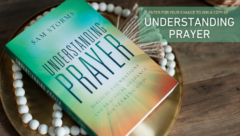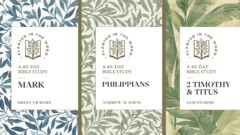
Here we are, at the beginning of another edition of Reading Classics Together. This is a program I began several years ago in an attempt to read some of the classics of the Christian faith and to do so in community. To this point we’ve read 10 or 15 great books, ranging from Puritan to modern-day classics. Beginning today we will be taking 13 Thursdays to read through John Stott’s The Cross of Christ.
The format is simple. Each week we will read a single chapter and then, on Thursday, we will convene here to offer some thoughts and reflections on that week’s reading. I hope you will read along with us! Here is information on doing just that.
The Centrality of the Cross
The first chapter of this book is titled “The Centrality of the Cross.” Here Stott seeks to prove that the cross is worthy of a place of centrality in the Christian faith, both as a symbol and as a central doctrine. To do this he offers a survey of early church history, of the life of Jesus and of the ministries of the Apostles. In every case he shows that the cross is central, the cross is the sign and symbol of the faith because it stands as the very purpose and pinnacle of Christ’s mission. Speaking of the example of the earliest Christians he says, “They wished to commemorate as central to their understanding of Jesus neither his birth or his youth, neither his teaching nor his service, neither his resurrection nor his reign, nor his gift of the Spirit, but his death, his crucifixion.”
Stott does a wonderful job of pointing out how unlikely it was that the cross would become the symbol of the Christian church. After all, both Romans and Jews despised crucifixion and regarded it with utter horror. “Whether their background was Roman or Jewish or both, the early enemies of Christianity lost no opportunity to ridicule the claim that God’s anointed and man’s Savior ended his life on a cross. The idea was crazy.” And yet the cross endured. “The fact that the cross became the Christian symbol, and that Christians stubbornly refused, in spite of the ridicule, to discard it in favor of something less offensive, can have only one explanation. It means that the centrality of the cross originated in the mind of Jesus himself.” From here he goes to show that from the moment of his birth Jesus’ life was on trajectory to take him to the cross. “From Jesus’ youth, indeed even from his birth, the cross cast its shadow ahead of him.” Jesus knew that he was living in order to die an atoning death on the cross.
This was my first big takeaway from the chapter: We need to understand the centrality of the cross against the backdrop of the culture of Jesus’ day. As much as we regard crucifixion with horror, we need to see that both Jews and Romans regarded it with much more horror. To speak of the Savior of the world being crucified was utterly unthinkable and utterly ridiculous to both groups. This then points us to the heart-change God must have wrought in our first century brothers and sisters that they would worship a man who was killed in such a way.
That leads to a second important takeaway: Jesus was not helplessly blundering through life, following a trajectory that he was opposed to. “Although he knew he must die, it was not because he was the helpless victim of evil forces arrayed against him or of any inflexible fate decreed for him, but because he freely embraced the purpose of his Father for the salvation of sinners, as it had been revealed in Scripture. … What dominated his mind was not the living but the giving of his life.” Because Christ was fully human, he must have recoiled at the thought of a looming crucifixion and the fullest expression of God’s curse. Yet because he was completely submitted to the will of God, he longed to fulfill God’s purpose for him and for all of humanity. While he was being dragged to the cross and nailed to it, at the same time and in the same act he went to the cross willingly.
Next Week
For next week please read chapter 2, “Why Did Christ Die?”
Your Turn
The purpose of this program is to read these books together. If you have something to say, whether a comment or criticism or question, feel free to use the comment section for that purpose.









